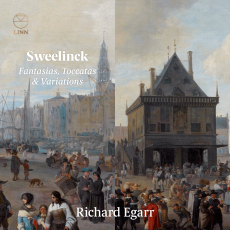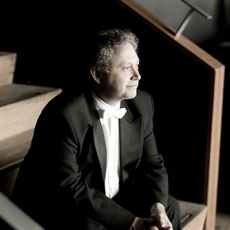Richard Egarr - Sweelinck: Fantasias, Toccatas & Variations - MusicWeb International
Richard Egarr’s booklet essay for this CD has, in parts, a somewhat polemical quality to it; in its second sentence he declares that Sweelinck’s keyboard music “is now mostly treated and delivered in a severe, dry and austere manner. Nothing about the musician, his music and his environment could be further from the truth”. Later he tells the reader that “Sweelinck’s music has suffered from many objective, colourless and academic performances and recordings in the name of ‘authenticity’. The modern way of playing this music in a non-expressive and detached manner is totally contrary to its vibrant and exciting nature”.
One doesn’t know quite which players Egarr has in mind in these strictures – and, for understandable reasons, he doesn’t name names. His judgement thus seems excessively sweeping. I have to say that when listening to Sweelinck played on the harpsichord, I have more often been moved to respect for his compositional skills than to ‘excitement’. Indeed, I have generally found Sweelinck played on the right kind of organ more rewarding than the general run of performances on the harpsichord, but what Egarr says is certainly not completely valid. To take just two examples, on the only part (GLOSSA GCD 922419) of Glossa’s ‘Complete Keyboard Works’ that I have heard, I found rather too many readings in which respect and a particular idea of authenticity rather limited the performer’s investment of his own personality in each piece. On the other hand, the 9 CD set (NM Classics NMC 92119) doesn’t, in very large part, seem to deserve Egarr’s strictures, so I can see only a degree of truth in what Egarr says.
What I have found particularly disappointing over the years is the frequency with which historians of music and musicologists have tended to celebrate Sweelinck’s influence – which was, of course, very considerable – rather than his works. Even Julie Anne Sadie in her 1990 Companion to Baroque Music (a well-informed and useful book of which I am rather fond) says, quite baldly, “[Sweelink’s] greatness lay not so much in his music as in his influence”.
But enough about Richard Egarr’s essay – it would be more profitable now to turn to his playing. To refer, for one last time to his essay, he tells us there that he hopes “to persuade … the listener of the glorious nature of this rich and wonderful music”; and, on balance, it is fair to say that Egarr’s performances on this disc do discover in Sweelinck a vibrancy and excitement which I haven’t often heard before. Egarr’s playing is built on a vigorous sense of rhythm.
Since this is not any kind of ‘completist’ venture - which can often make performers err on the side of ‘reliability’ and caution - Egarr has the freedom to limit himself to almost 80 minutes’ worth of his favourite pieces by Sweelinck and there is no doubt that his love of this music is evident throughout. The opening track, the ‘Praeludium Toccata’ makes a fine calling card both for Sweelinck the composer and Egarr the harpsichordist. It opens with a sense of drama and there is a certain theatricality (in a good sense) to what follows, in which musical gestures are neither understated nor exaggerated. Other highlights include the ‘Fantasia Crommatica’. Egarr’s playing here is beautifully sustained and in places quite dazzling. The effect of this work, in particular, is enhanced by the adoption of “a low pitch in quarter-comma meantone” (in Egarr’s words) on his harpsichord, which was made by Joel Katzman in 1991 after a Ruckers instrument of 1638. The variations on ‘Mein junges Leben hat ein Endt’ come off particularly well, being full of rich humanity. Egarr is well able to do justice both to the strict counterpoint of the ‘Fantasia Crommatica’ and to the greater freedom of the ‘Echo Fantasia’, though for all the quality of Egarr’s performance, this is a piece which I am still inclined to think is better suited to the organ.
Egarr gives us a delightful account of the ‘Paduana Lachrimae’, which is more often referred to as the ‘Pavana Lachrimae’, Sweelinck’s interesting variations on three short themes from Dowland’s ‘Flow My Teares’ being engagingly characterised.
That word ‘character’ is perhaps what most distinguishes the very best performances of Sweelinck’s keyboard works (including Egarr’s) from the ‘merely’ good ones. Egarr’s readings certainly have such ‘character’ – his insight and imagination find a distinctive truth, a range of structural wit and human emotion, in each piece, while still recognizing that Sweelinck was a master of the compositional techniques of his day.
Of the single disc harpsichord recitals of Sweelinck’s music that I am familiar with, this is one of the very best. Since I like interpretations of the keyboard music of the baroque – or, as here, of the early or proto-baroque - to have a theatricality about them, I have derived a good deal of pleasure from this disc. For lovers of the Elizabethan school of keyboard music, the clear signs that Sweelinck was familiar with that music - doubtless through his friendship with John Bull and Peter Philips - will add a further layer of pleasure.

